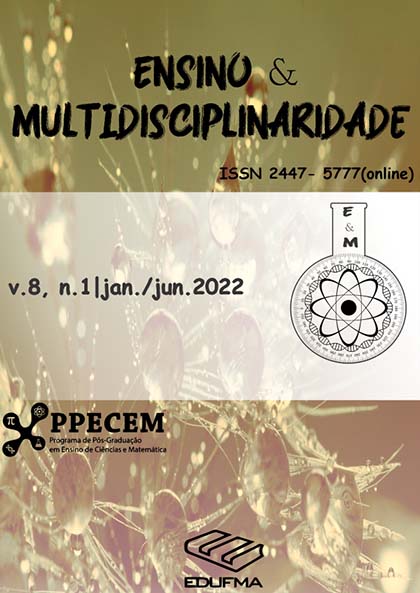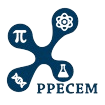Reductionism, emergency and science teaching
DOI:
https://doi.org/10.18764/2447-5777v8n1.2022.7Keywords:
Scientific Methods, Philosophy of Science, Life, ConscienceAbstract
The present paper aimed to investigate the meanings of the concepts of reductionism and
emergence in the scientific field and how this knowledge can contribute to educational activities.
Different disciplines can use these concepts to stimulate scientific debate and the use of logical
arguments. The debate around this duality generated supporters on both sides, especially from
the 1970s onwards. However, its philosophical nature is not limited to a discussion only in the academic sphere; it also has consequences for the area of education. Thus, it is important to explore the possibility of using the developments of this issue as central themes in teaching activities. Relevant works were selected and examined from the point of view of the knowledge they added to the theoretical foundation of didactic actions. An internet search was carried out using certain descriptors on the search engine Google Scholar to roughly estimate the volume of research in some specific sub-areas considered throughout this investigation. It was found that there is more research on reductionism in biology than in other disciplines, as well as more work on the origin of life than on the origin of consciousness.
Downloads
Metrics
References
ABRANTES, P. T. Nagel e os limites de um reducionismo fisicalista (uma introdução ao artigo “What is it like to be a bat?”). Cadernos de História e Filosofia da Ciência, Campinas, Série 3, v. 15, n. 1, p. 223-244, 2005. Disponível em: https://repositorio.unb.br/bitstream/10482/15322/1/ARTIGO_TNagelLimitesReducionismo.pdf. Acesso em: 20 jan. 2022.
KUHN, T. S. A estrutura das revoluções científicas. São Paulo: Perspectiva, 1996.
LAUGHLIN, R. B. A different universe: reinventing physics from the bottom down. Nova York: Basic Books, 2005.
LORENZ, K. Os fundamentos da etologia. São Paulo: Editora da Unesp, 1995.
MAYR, E. O desenvolvimento do pensamento biológico: diversidade, evolução e herança. Brasília: Editora da UnB, 1998.
MORIN, E. Ciência em consciência. São Paulo: Bertrand Brasil, 2005.
NAGEL, T. Como é ser um morcego? Revista da Abordagem Gestáltica: Phenomenological Studies, v. 19, n. 1, p. 109-115, 2013. Disponível em: https://www.redalyc.org/pdf/3577/357735557011.pdf. Acesso em: 18 jan. 2022.
NAGEL, T. What is it like to be a bat? The Philosophical Review, v. 83, n. 4, p. 435-450, 1974. Disponível em: q. Acesso em: 20 jan. 2022.
NICOLINI, L. B.; FALCÃO, E. B. M.; FARIA, F. S. Origem da vida: como licenciandos em Ciências Biológicas lidam com
este tema? Ciência & Educação, v. 16, n. 2, p. 355-367, 2010. https://doi.org/10.1590/S1516-73132010000200006
OKI, M. C. M.; MORADILLO, E. F. O ensino de história da química: contribuindo para a compreensão da natureza da ciência. Ciência & Educação, v. 14, n. 1, p. 67-88, 2008. https://doi.org/10.1590/S1516-73132008000100005
OLIVEIRA, D. A. B.; GOMES, V. B. Uma crítica ao reducionismo filosófico da química à mecânica quântica como elemento fundamental para a formação de professor. Ciência & Educação, v. 27, e21074, 2021. https://doi.org/10.1590/1516-731320210074
PESSOA JR., O. Duas tradições na sistêmica: holismo organicista e reducionismo separabilista. In: GONZALEZ, M. E. Q.; MORAES, J. A.; KERR, D. M. (org.). Informação e ação: estudos interdisciplinares. São Paulo: Editora Cultura Acadêmica/Unesp, 2013a. p. 295-327. Disponível em: https://opessoa.fflch.usp.br/sites/opessoa.fflch.usp.br/files/AO-Duas-tradicoes-final.pdf. Acesso em: 20 jan. 2022.
PESSOA JR., O. Emergência e redução: uma introdução histórica e filosófica. Ciência e Cultura, v. 65, n. 4, p. 22-26, 2013b. https://doi.org/10.21800/S0009-67252013000400011
PRIGOGINE, I. El redescubrimiento del tiempo. Archipiélago – Cuadernos de Crítica de la Cultura, Madri, n.10-11, p. 69-82, 1992. Disponível em: https://4grandesverdades.files.wordpress.com/2009/12/ilya-prigogine-redescubrimiento-del-tiempo.pdf. Acesso em: 20 jan. 2022.
RAMOS, J. P.; TEIXEIRA, L. M.; BARBOSA, J. I. C. Skinner: sobre o reducionismo. Rede Brasileira de Análise do Comportamento, v. 16, n. 2, p. 103-112, 2020. https://doi.org/10.18542/rebac.v16i2.9604
SÁNCHEZ-ARTEAGA, J. et al. Alterização, biologia humana e biomedicina. Scientiae Studia, v. 13, n. 3, p. 615-641, 2015. https://doi.org/10.1590/S1678-31662015000300007
SCHERMA, M. A.; MIRANDA, V. G. Relatos de uma jornada exploratória por grupos com viés anti-ciência. Revista UFG, v. 20, n. 26, e66663, 2020. https://doi.org/10.5216/revufg.v20.66663
SCHULZ, P. A. Reducionismo versus complexidade: o pensamento de Phil Anderson e sua influência em outras áreas. Revista Brasileira de Ensino de Física, v. 43, Supl. 1, e20200432, 2021. https://doi.org/10.1590/1806-9126-RBEF-2020-0432
ULANOWICZ, R. E. Ecology: the ascendant perspective. Nova York: Columbia University Press, 1997.
VAN GULICK, R. Reduction, emergence and other recent options on the mind/body problem. Journal of Consciousness Studies, v. 8, n. 9-10, p. 1-34, 2001. Disponível em: https://opessoa.fflch.usp.br/sites/opessoa.fflch.usp.br/files/Van-Gulick-Reduction-and-emergence-2001.pdf. Acesso em: 20 jan. 2022.
VASCONCELLOS, Á. R.; RODRIGUES, C. G.; LUZZI, R. Complexidade, auto-organização e informação em sistemas dinâmicos. Revista Brasileira de Ensino de Física, v. 37, n. 2, 2314, 2015. https://doi.org/10.1590/S1806-11173721806
WEINBERG, S. The limits of reductionism. Nature, v. 331, p. 475-476, 1988. https://doi.org/10.1038/331475a0
WEINBERG, S. Unified theories of elementary-particle interaction. Scientific American, v. 231, n. 50, 1974. Disponível em: https://www.scientificamerican.com/article/unified-theories-of-elementary-part/. Acesso em: 20 jan. 2022.
WILSON, E. O. Sociobiology: the new synthesis. Cambridge: Harvard University Press, 1975.
WONG, H. Y. The secret lives of emergents. In: CORRADINI, A.; O’CONNOR, T. (org.). Emergency in science and philosophy. Nova York: Routledge, 2010. p. 7-27.
WORLD O METER. GDP by country. Disponível em: https://www.worldometers.info/gdp/gdp-by-country/. Acesso em: 22 jan. 2022.
ZYLBERSZTAJN, A. Teoria final, unificação e reducionismo: opiniões da comunidade brasileira de física. Revista Brasileira de Ensino de Física, v. 25, n. 1, p. 1-17, 2003. https://doi.org/10.1590/S1806-11172003000100001
Downloads
Published
How to Cite
Issue
Section
License
Copyright (c) 2022 Ensino & Multidisciplinaridade

This work is licensed under a Creative Commons Attribution 4.0 International License.
Autores que publicam nesta revista concordam com os seguintes termos:
a. Autores mantém os direitos autorais e concedem à revista o direito de primeira publicação, com o trabalho simultaneamente licenciado sob a Licença Creative Commons CC BY que permite o compartilhamento do trabalho com reconhecimento da autoria e publicação inicial nesta revista.
b. Autores têm autorização para assumir contratos adicionais separadamente, para distribuição não-exclusiva da versão do trabalho publicada nesta revista (ex.: publicar em repositório institucional ou como capítulo de livro), com reconhecimento de autoria e publicação inicial nesta revista.
c. Autores têm permissão e são estimulados a publicar e distribuir seu trabalho online (ex.: em repositórios institucionais ou na sua página pessoal) após a publicação final do manuscrito.




















